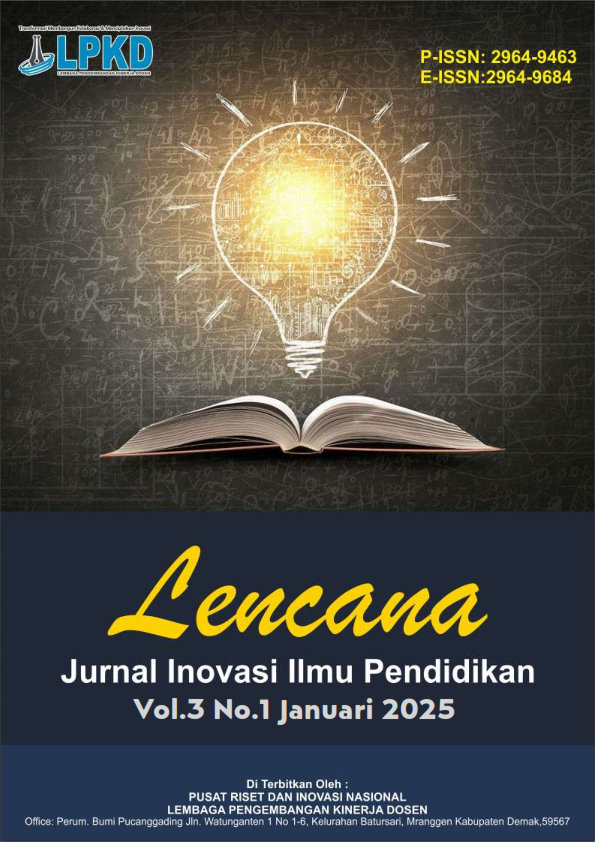Pengaruh Model Problem Based Learning (PBL) terhadap Hasil Belajar Kognitif pada Mata Pelajaran IPAS Siswa Kelas VI SDN Bandungrejo 1
DOI:
https://doi.org/10.55606/lencana.v3i1.4492Keywords:
PBL, cognitive learning outcomes, IPASAbstract
This study aims to determine the effect of the problem-based learning model on cognitive learning outcomes in the IPS subject of sixth-grade students at SDN Bandungrejo 1. This research uses a quantitative method with a pre-experimental design in the form of a one-group pre-test post-test. The data sampling technique used in this research is total sampling. The data collection technique involves using observation sheets to assess the implementation of learning activities by students and teachers, as well as pre-tests on cognitive learning outcomes. The results of this study show that the comparison of the total pretest score of 208 and the posttest score of 603, with an average pretest score of 8.66 and an average posttest score of 25.12. It can be concluded descriptively that the posttest scores after the treatment with the problem-based learning model were much higher compared to the pretest scores before the treatment was given. The results of the non-parametric statistical test calculation using the Wilcoxon signed rank test show an Asymp Sig. (2-tailed) value of < 0.001 < 0.05, which means Ho is rejected and Ha is accepted. It can be concluded that there is a difference in pretest and posttest results after the treatment using the problem-based learning model, which means that the use of the problem-based learning model affects the cognitive learning outcomes of sixth-grade students at SDN Bandungrejo 1.
Downloads
References
Azhari, Y. I. S. (2022). Bab 3 metode penelitian. Repository.Upi.Edu, 5, 2013–2015. Retrieved from http://repository.upi.edu/61268/4/S_JKR_1604261_Chapter3.pdf
BSNP. (2010). Paradigma pendidikan nasional abad XXI. [Online]. Available at: [URL].
Dimyati, M., & Mudjiono, M. (2009). Belajar dan pembelajaran. Jakarta: Rineka Cipta.
Dogani, B. (2023). Active learning and effective teaching strategies. International Journal of Advanced Natural Sciences and Engineering Researches, 7(4), 136–142. https://doi.org/10.59287/ijanser.2023.7.4.578
Fauziah, A., Rahman, T., & Samsudin, A. (2022). Pentingnya lembar kerja siswa IPA berbasis metakognitif untuk melatih kemampuan analytical thinking dan pemecahan masalah siswa SMP. Jurnal IPA & Pembelajaran IPA, 6(4), 356–368. https://doi.org/10.24815/jipi.v6i4.27355
Hamalik, O. (2007). Manajemen pengembangan kurikulum. Bandung: PT. Remaja Rosda Karya.
Harahap, R. (2021). Penerapan model pembelajaran Problem Based Learning (PBL) untuk meningkatkan kemampuan pemahaman konsep peserta didik pada materi himpunan di kelas VII C SMP Negeri 2 Bandar Laksamana. Jurnal Pendidikan, 3(4), 383–389.
Harwati, C. (2021). Penerapan model pembelajaran Problem Based Learning untuk meningkatkan keaktifan belajar siswa. Jurnal Pendidikan Profesi Guru, 2(2), 51-55.
Indah, R. P., & Farida, A. (2021). Pengaruh kemandirian belajar siswa terhadap hasil belajar matematika. Jurnal Derivat: Jurnal Matematika dan Pendidikan Matematika, 8(1), 41–47. https://doi.org/10.31316/j.derivat.v8i1.1641
Kadir, K. (2015). Statistika terapan: Konsep, contoh, dan analisa data dengan program SPSS/Lisrel dalam penelitian. Jakarta: PT. Rajagrafindo Persada.
Litbang Kemdikbud. (2013). Kurikulum 2013: Pergeseran paradigma belajar abad 21.
Maryatun, M. (2017). Pengaruh penggunaan model Problem Based Learning (PBL) terhadap hasil belajar ekonomi siswa kelas X semester genap SMA PGRI 1 Metro tahun pelajaran 2016/2017. PROMOSI (Jurnal Pendidikan Ekonomi), 5(2), 152–159. https://doi.org/10.24127/ja.v5i2.1225
Nofziarni, A., Aisyah, dkk. (2019). Pengaruh penggunaan model Problem Based Learning (PBL) terhadap hasil belajar siswa di sekolah dasar. Jurnal Basicedu, 3(4), 2017-2024.
Rusman. (2010). Model-model pembelajaran mengembangkan profesionalisme guru (Edisi ke-2). Depok: PT. Rajagrafindo Persada.
Shodiq, S. F. (2019). Revival tujuan pembelajaran pendidikan agama Islam (PAI) di era revolusi industri 4.0. At-Tajdid: Jurnal Pendidikan dan Pemikiran Islam, 2(02), 216–225. https://doi.org/10.24127/att.v2i02.870
Sudjana, N. (1989). Dasar-dasar belajar mengajar. Bandung: Sinarbaru.
Sugiyono. (2016). Metode penelitian kuantitatif, kualitatif dan R&D (Cetakan ke-24). Bandung: Alfabeta.
Sugiyono. (2019). Metode penelitian kuantitatif. Bandung: Alfabeta.
Syafriana, D. (2017). Penerapan model Problem Based Learning (PBL) dalam peningkatan saintifik untuk meningkatkan hasil belajar IPA kelas V SDN 63 Surabaya. Jakarta: Prodi Pendas UNJ.
Syah, M. (2008). Psikologi belajar. Jakarta: PT. Raja Grafindo Persada.
Taufik Adi Sarwoto, Budi Jatmiko, & Elok Sudibyo. (2020). Development of online science teaching instrument based on scientific approach using PhET simulation to improve learning outcomes at elementary school. IJORER: International Journal of Recent Educational Research, 1(2), 90–107. https://doi.org/10.46245/ijorer.v1i2.40
Trianto, H. (2011). Mendesain model pembelajaran inovatif-progresif. Jakarta: Kencana.
Wajdi, M., & Amir, N. (2021). Improving students' motivation and learning outcomes using Edmodo learning media assisted with meeting room media on the circulation system materials. Jurnal Pendidikan, 2(4), 392–401.
Downloads
Published
How to Cite
Issue
Section
License
Copyright (c) 2024 Lencana: Jurnal Inovasi Ilmu Pendidikan

This work is licensed under a Creative Commons Attribution-ShareAlike 4.0 International License.








